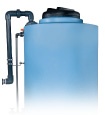Compliance for Chemical Storage Tanks: What You Need to Know About ASTM D-1998 and NSF/ANSI/CAN-61
This article is the first in a two-part series that provides an overview of some important industry and regulatory compliance issues you should be aware of when purchasing a chemical storage tank. This series doesn’t cover an all-inclusive list of compliance regulations, but you can use the articles to give you a confident start in understanding the requirements to consider when purchasing a chemical storage tank.

ASTM D-1998 and NSF/ANSI/CAN-61 regulations are among the most familiar compliance requirements in the industry, but they are also commonly misunderstood. Let’s set the record straight.
ASTM D-1998
When it comes to polyethylene storage tanks, outward appearances can often be misleading, making it difficult to differentiate between high-quality designs and inferior products. Unfortunately, many buyers are unaware that tank construction is governed by specific standards, particularly those outlined by ASTM D-1998 — which not all manufacturers strictly follow.
ASTM standards stipulate that polyethylene tanks and their materials undergo a series of critical tests to evaluate their strength and structural integrity. For cross-linked polyethylene tanks, an additional test assesses the chemical composition of the materials used.
Together, these rigorous assessments ensure that consumers receive durable, safe, and reliable chemical storage solutions.
Before investing in a polyethylene chemical tank, it is crucial to confirm that the manufacturer complies with the ASTM D-1998 specifications. Never purchase a chemical storage tank without:
- Requesting access to hoop stress data
- Understanding how tank stress is measured
- Reviewing the manufacturer's designed wall thickness data sheets
These technical documents, validated by the manufacturer, serve as essential proof that the tank meets stringent industry standards.
While opting for a lower upfront cost might seem appealing, it can lead to significant financial repercussions in the event of tank failure or reduced useful life. In the realm of storage solutions, knowledge is key. Understanding these standards can make the difference between investing in a high-performing, reliable tank and settling for a poorly constructed alternative.
Download the ASTM D-1998 Technical Bulletin: Standard Specification for Polyethylene Upright Storage Tanks, which introduces the ASTM D-1998 standard and highlights its importance. Inside the bulletin, you will find an overview of ASTM D-1998, along with the technical tests and procedures involved in the production of polyethylene chemical tanks.
NSF/ANSI/CAN-61 Certification
If you manufacture, sell, or distribute water treatment products in North America, compliance with NSF/ANSI/CAN-61 is typically required to ensure health and safety by preventing toxic leaching from water system components. This standard, developed by the National Sanitation Foundation (NSF) and the American National Standards Institute (ANSI), establishes rigorous testing criteria for equipment that contacts potable water.
Testing involves evaluating equipment with water at different pH levels, and for chemical storage tanks, more stringent tests with chemicals certified to NSF/ANSI/CAN-60 are necessary. The tanks are assessed after exposure to chemicals to detect any harmful leachants. Proper certification is crucial, yet confusion regarding NSF/ANSI/CAN-61 levels can lead to purchasing inappropriate products.
To confirm compliance, consult the NSF website for certifications and details about chemical concentrations that specific components can handle. It’s essential to understand that both the tank and all accompanying fittings and accessories must hold NSF/ANSI/CAN-61 certification for the entire system to be compliant.
Poly Processing offers a unique full-system approach to NSF/ANSI certification for chemical storage tanks, ensuring that not just the tanks but also all fittings, gaskets, and additional components meet the required standards.
We currently have NSF/ANSI/CAN-61 certification for 38 popular water treatment chemicals for our XLPE tank systems, which include options like the OR-1000™ engineered antioxidant system for added safety. Our tanks are suitable for both potable water (HDPE) and chemical storage (XLPE).
For the best assistance possible, check out our resources such as the OR-1000™ guide and an eBook detailing NSF/ANSI/CAN 61 certification specifics.
Industry News
For over five decades, Poly Processing has been at the forefront of innovation in chemical storage tank design and manufacturing. Reinforcing our commitment to advancing high density crosslinked polyethylene (HDXLPE) tank technology, we are thrilled to unveil our latest update to our vertical storage tank solutions: the 15,500-gallon IMFO tank, the 15,000-gallon Sloped Bottom IMFO tank, and the 15,500-gallon Vertical tank, are all available in specific gravities up to 2.2 design.
These large innovative HDXLPE tanks are designed for exceptional durability, reliable performance, and an extended lifespan across a variety of applications. To enhance protection and prolong service life in oxidative environments, such as those involving sodium hypochlorite, they can be manufactured with our industry-leading OR-1000 engineered resin system, known for its remarkable resistance to oxidative chemicals.
These tanks represent the best engineering and design in the tank manufacturing industry, and they are covered under PPC’s industry-leading warranty.
At Poly Processing, we’re focused on delivering high-quality, forward-thinking solutions to meet the evolving demands of the chemical storage industry.
- May 26, 2025
- Topics: News and Customer Stories, Tank Design and Materials
About Poly Processing
Posts By Topic
Tech Talk Podcast Episodes
Subscribe By Email
Recent Posts
- Ferric Chloride Storage: What Operators Need to Know Before Choosing a Tank
- Wastewater Treatment: Modern Approaches to Sludge Removal & Chemical Management
- Why Cycling Causes Tank Failure: Tips for Prolonging Tank Life
- Small Changes in Tank Selection for Big Long-Term Cost Benefits
- NSF Certification vs. FDA Compliance: Understanding Chemical Tank Standards
Tank Configurator

Find the recommended tank and system components for your chemical storage challenge.
Configure a Tank Package







